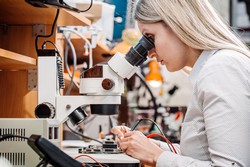New polymer composites for organic bioelectronics
The POLYMED (Novel conducting polymer composites for applications in medicine) project has forged a collaboration between expert research teams in Europe, the United States and Canada to foster progress in organic bioelectronics through the development of new materials. Targeted technologies could be used in biological sensors for healthcare and prosthetics. Strong communication and collaboration between students and partners from the very outset meant exceptional progress throughout the project period. POLYMED achieved all of its objectives and technical goals. ‘Organic electrochemical transistors’ (OECTs), where ions penetrate a polymer film and modulate its conductivity, can transduce ionic into electronic signals. As a result, they make ideal biological sensing elements and can be constructed using biocompatible materials. Researchers under the POLYMED umbrella successfully developed a first-generation materials platform for organic semiconductors. Incorporating crown ethers, specific ion flow can be controlled. Criteria for the design of materials were also developed for single component systems that enable ion flow. Blending strategies of materials further promoted the passage of ions. To assess the rate of ion and proton flow, scientists developed a method for organic-based materials systems. The new materials system will provide the basis for producing OECTs that operate in accumulation mode. The benefits in comparison to depletion mode include accelerated performance and stability in an aqueous environment. High-profile journals Nature Communications, Royal Society of Chemistry and Nature Scientific Reports published papers from POLYMED’s research results. Disposable paper breathalysers for alcohol, organic light emitting diodes and high-efficiency solar cells are just some of the areas where POLYMED technology can make a difference.







